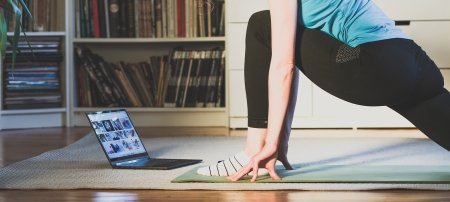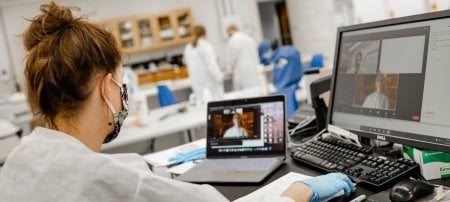The pandemic’s impacts on our campus research ecosystem are many and varied. In their guest blog, Steve Elmer and Isaac Wedig explain why exercise is medicine everyone should take — especially in the era of COVID-19.
During the COVID-19 pandemic, people are moving less and sitting more. This is a major concern because low levels of physical activity and increased sitting are risk factors for numerous health conditions, including heart disease, obesity and diabetes. Research also suggests that low levels of physical activity can increase risk of experiencing a severe case of COVID-19. Accordingly, our recent work has focused on promoting exercise as a form of medicine in Michigan’s Upper Peninsula to keep our local communities healthy and more resilient.
Importantly, the COVID-19 vaccine is the most effective tool we have to protect against the virus. Breakthrough infections, while rare, can occur — and thus, the vaccine is not perfect. Aside from getting vaccinated, continuing to wash your hands, wearing a mask and social distancing when appropriate, exercising regularly may be the single most important thing you can do to reduce your risk of becoming very sick if infected with the SARS-CoV-2 virus.
Physical Inactivity Linked to Severe COVID-19 Cases
A landmark study published by Dr. Robert Sallis with the Department of Family and Sports Medicine at the Kaiser Permanente Medical Center in California showed a strong link between physical activity level and severe COVID-19 in 48,000 adults. People with COVID-19 who exercised fewer than 10 minutes per week were more likely to be hospitalized, be admitted to the intensive care unit, and die compared to those who exercised 150 minutes per week.
"Other than advanced age and history of organ transplant, low physical activity was the strongest risk factor for severe COVID-19 outcomes — even more so than smoking, high blood pressure, obesity, heart disease, diabetes or cancer."
These findings were presented by Sallis at the UP Health Science & Medicine Lecture in June.
Researchers at the University of New Mexico are currently determining if the protective immunity that people get from COVID-19 vaccine is related to their level of physical activity and fitness. This research could shed light on the importance of exercising regularly to further boost immune function.
Moreover, it is well established that regular exercise helps prevent and treat many health conditions (including heart disease, obesity and diabetes) that increase the risk of illness and death in people infected with the virus.
Our message that exercise is a critical component for maximizing health during the COVID-19 pandemic has been shared through newspaper, radio, podcasts, town hall forums, blog posts and published infographics.
Numerous health organizations, including the Centers for Disease Control and Prevention, recommend that adults engage in at least 150 minutes of moderate to vigorous exercise each week. While it may seem like a lot, this translates to about 20 minutes each day. Importantly, the benefits of exercise are not all-or-nothing, and any amount of activity, even below the recommended level, can provide health benefits.
Informal activities such as walking the dog, doing yardwork, cleaning the house and playing with your children also count as physical activity and can easily add up throughout the day. It is also important to focus on limiting the time you spend sitting. Breaking up prolonged periods of sitting with short active movement breaks is a great way to reduce sitting time and increase physical activity levels. For example, try to do two minutes of walking, standing or climbing stairs for every 30 to 60 minutes of sitting.
More Than 200 Free and Locally Developed Virtual Workouts
To help community members stay active during the pandemic, we developed a free virtual exercise program called UP and Moving. We have delivered over 225 home-based workouts to students, staff and area community members with a wide range of fitness and mobility levels (participants have ranged from 18 to 70 years of age). These workouts have included aerobic exercise like walking, weightlifting exercise using common household items, yoga, virtual hikes and more.
Each workout is delivered live through Zoom and Facebook, and is archived to both our YouTube channel and website. Select workouts have also been aired on ABC 10 TV. Ultimately, when aiming to include more exercise into your life, you should find activities that you enjoy and can easily fit into your daily routine.
As our knowledge about COVID-19 has continued to evolve, the important role that exercise plays in combating the disease has become increasingly clear. Exercise can offer a powerful form of medicine — so get UP and Moving!
Michigan Technological University is an R1 public research university founded in 1885 in Houghton, and is home to nearly 7,500 students from more than 60 countries around the world. Consistently ranked among the best universities in the country for return on investment, Michigan's flagship technological university offers more than 185 undergraduate and graduate degree programs in science and technology, engineering, computing, forestry, business, health professions, humanities, mathematics, social sciences, and the arts. The rural campus is situated just miles from Lake Superior in Michigan's Upper Peninsula, offering year-round opportunities for outdoor adventure.






Comments